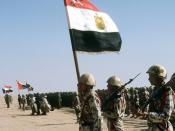The United Nations intervention in the Gulf War of 1991 represented a controversial turning point in the development of the organization, despite having a firm legal basis and adhering to its purposes and principles. The Iraqi invasion of Kuwait on 2 August 1990 was met with unanimous UN condemnation, imposing sanctions and calling for the withdrawal of Iraqi troops. UN motivation for intervention was based primarily on institutional aims and principles, in addition to US and Soviet national interest in the context of the end of the Cold War. Due to greater collaboration within the Security Council the UN adopted an increasingly active international role. As a result of Saddam Hussein's non-cooperation and the failure of several UN diplomatic initiatives, resolution 678 was passed, authorising the use of collective force to restore regional and international security and acted upon on 16 January, 1991 by an international coalition. This resolution complied with the UN Charter of 1945 and was therefore justified.
In addition, resolution 687 imposed further sanctions, to be lifted only after Saddam's compliance with UN conditions aiming for the restoration of peace and stability. Although this resolution was also justified, adhering to the principles of the UN, its failure had severe impact on the Iraqi population.
The Iraqi invasion of Kuwait challenged the fundamental basis of the UN, "to maintain international peace and security" , thus providing the primary reason for its intervention in the Gulf War. As stated in the UN Charter, the organisation aims to achieve this through the establishment of a structure designed to "take effective collective measures for the prevention and removal of threats to the peace, and for the suppression of acts of aggression or other breaches of the peace". The UN believed Saddam's actions to be incompliance with this statement, demonstrating his willingness...


